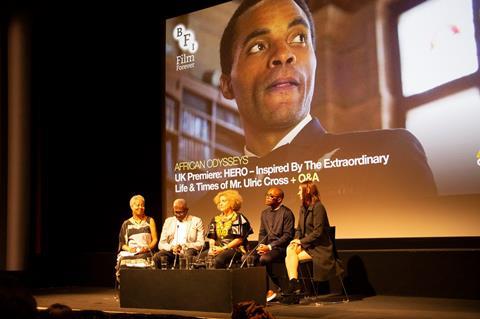
The British Film Institute (BFI) says the organisation “remains committed” to the African Odysseys programme, as an online petition voicing concerns over the programme’s future reached 12,078 signatures, as of October 25.
African Odysseys is a 17-year-old programme that was set up in 2007 by grassroots Black community activists who were already showing films at various London venues, with a view to give a singular home to those films, advise and help the BFI show African diaspora content and bring an underserved Black audience into the BFI Southbank, as well as offering training to young Black filmmakers. It includes a monthly strand of programming as well as accompanying seasons.
The programme was co-founded by Tony Warner from Black History Walks and David Somerset of the BFI and runs at least once a month with screenings and seasons covering the work of such figures as Ousmane Sembene, Horace Ove and Raoul Peck. Most recently, James Baldwin has been celebrated with a six-week season.
Concern over its future emerged when it became known in June that Somerset, who continued to run the programme as education/film programmer, was facing redundancy amid a BFI restructure.
“The African Odysseys event series has been a valuable and vitally important part of the BFI programme for 17 years, and it remains so,” the BFI said today in a statement. ”There is some misleading information around the programme out there and we want to reassure everyone that we have no desire or intention for it to end and we remain committed to it.
“As it approaches its 20th anniversary we have been discussing a celebratory season, and exploring ways to further our commitment to the strand, and to our wider commitment to wider Black screen culture, which is platformed through seasons and runs in our cinemas, premiered in our festivals and presented online via BFI Player.”
The BFI was unable to respond to Screen’s question on the status of an individual’s employment, but confirmed it has undertaken a consultation period as part of a wider restructure designed to evolve its teams in line with priorities set out in the Screen Culture 2033 strategy. That consultation period is now over, it confirmed.
“Any outcome of the restructure will not impact or in any way diminish the BFI’s commitment to or dedicated resourcing of African Odysseys,” said a BFI spokesperson.
Concerns

A voluntary steering group that helps run the programme, which includes Warner and lecturer and researcher Gus John, started the online petition to voice concern about the future of the strand and how it would or could continue without a clear figurehead with the relevant experience in post at the BFI. Industry figures to lend their voices to the petition include Indra Ove, daughter of filmmaker Horace Ove, actor Adjoa Andoh and academic Erica Carter.
“We’re bringing people [to the BFI Southbank] who would never go there before,” said Warner. “When we first started, we had to put people on the Southbank looking for lost Black people to say look – the BFI is down this street. They had no concept of where it was.”
The BFI has lodged a complaint with Change.org, where the petition is housed, requesting it be taken down as it is based on the “incorrect assertion” that the BFI is cancelling African Odysseys.
The BFI has said it remains committed to a 20th anniversary celebration in 2026. “We have AO [African Odyssey] events confirmed for December ‘24 and January ’25 and we look to continuing to work with AO positively and collaboratively going forward and programming events with them on at least a monthly basis throughout 2025,” said the spokesperson.
The steering committee had also previously raised concerns with the BFI over being overlooked within the institution, in a letter sent to CEO Ben Roberts on June 23, 2020 and a follow-up letter sent on May 5, 2023, plus in a meeting in August 2023. The group’s concerns include a lack of funding for marketing materials such as the filming of Q&A sessions, which the steering group organised itself.
A spokesperson for the BFI responded: “AO has been supported with a bespoke marketing budget to enable guest attendance and space for post-event discussions. The AO group have been invited to programme and present seasons of films, for example, summer 2022’s major Reggae on Film season which was supported by a significant press and marketing campaign, and there is a dedicated AO collection on BFI Player. We have also collaborated with AO on BFI At Home events when BFI Southbank was closed due to the pandemic.”
The steering committee has also requested the BFI undertake a Race Equality Impact Assessment (REIA) – which is an examination of how different racial and ethnic groups will likely be affected by a proposed action or decision - but has been told by the BFI the request has been rejected.
“The number of staff directly affected by the restructure is very small – under 10,” said the BFI spokesperson. “Our HR guidance states that with such a small sample: a) we should not be disclosing ethnicity data because staff can be identified, b) no meaningful equality analysis can take place because statistically no meaningful insights can be gained. In terms of audiences – the second key area an EIA would be interested in – we have confirmed that the programme continues therefore no adverse impact exists.”






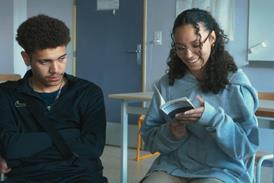


![[Clockwise from top left]: 'The Voice Of Hind Rajab', 'A House Of Dynamite', 'Jay Kelly', 'After The Hunt', 'The Smashing Machine'](https://d1nslcd7m2225b.cloudfront.net/Pictures/274x183/1/7/0/1459170_veniceawards_837515.jpg)


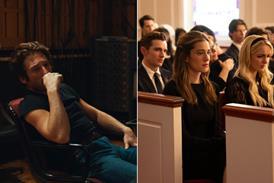

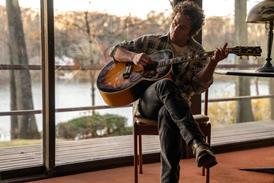

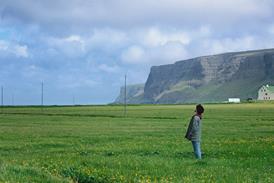
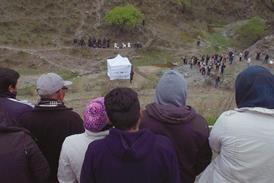







No comments yet